Outside Looking In
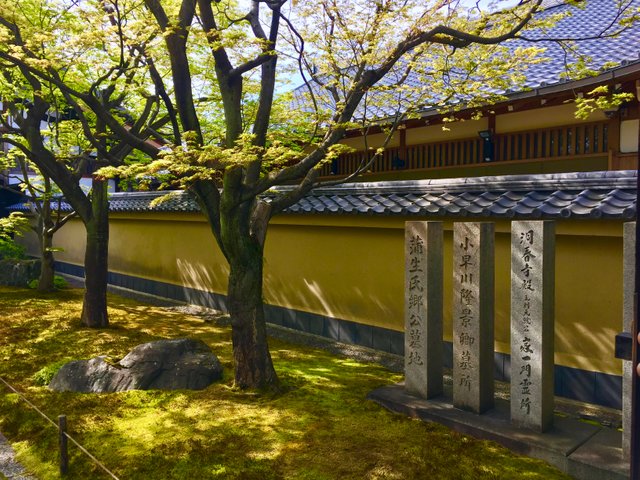
A Zen pilgrimage into my true nature
I’ve spent the last 6 days either in transit or trying to keep up with the Tokyo hustle. My muscles ache, my mind is over-stimulated from a saturation of new experiences, and my spirit yearns for silence and stillness. I discover that I have the opportunity to attend a Zen meditation session at a functioning temple in Kyoto. What I received was an insight into the real Japan, and an insight into my own heart.
Well every day just brings the same
You go out looking for some strange new games
Pretty soon them games ain’t fun anymore
And it’s something else that you’re looking for
You’ve got all the answers, you and your friends
And I’m on the outside looking in
— Bruce Springsteen
Getting up early in the morning, I make my way to Shunkō-in temple, a functioning Zen Buddhist temple which is part of the Myōshin-ji temple complex. Once I’ve paid my admission fee and remove my shoes, I’m escorted to the meditation room where the session has only just begun. The room is only lightly filled with other (Western) tourists, and the teacher — a Zen Monk — speaks with a slight American accent. Everyone is sitting cross-legged on the tatami floor. I choose to sit on a stool at the back.
The monk begins explaining Zen and meditation by asking the participants why they are all sitting cross-legged on the floor. Someone answers that it is because that is what pictures of meditation always present to us. The monk explains that we it isn’t necessary to do so, and that ideally we should be in a comfortable position so that we are not distracted by trying to sit in positions we think we should be seated in. He uses this as a metaphor to explain how the purpose of meditation (in the Zen tradition) is for each of us to enquire and challenge our own beliefs and values.
After some discussion along these lines, the meditation begins. Almost immediately my attention comes to my abdomen, and how uncomfortable it is. It feels like it is ‘full’, and this sense of fullness feels like it is blocking my breathing. I continue to ‘inquire’, allowing whatever arises to do so, observing without judging or analysing. There is a blockage here, it is preventing the free-flow of Qì between the upper and the lower.
A dialogue begins:
Why is it a problem that I feel this fullness in my abdomen?
I look bloated and fat.
Why is that a problem?
It hurts. It feels uncomfortable. I can’t breathe properly. I can’t do Qìgōng properly anymore.
And what does that mean?
I’m full of shit. I can’t let my shit go. This shit is holding me back.
Immediately I have an image of my body with needles in acupuncture points — Zhōngwan, Tiānshū, Zhāngmén. An assertive voice tells me I need to go see my practitioner when I return home, that I am out of harmony.
And what is the problem with being out of harmony?
I don’t know how to answer this. Surely disharmony means I cannot function and perform to the standard of my true nature?
How do you know this [state] is disharmony? Do you know your true nature?
I don’t know.
Considering how much work I have put into self-development and personal gnosis, the realisation that I really still don’t know my Self hits me. But the process of clearing this fullness is also the process to discovering my true nature.
My inquiry continues further for what seems like an eternity of no-time; the sound of the ringing bell marking the end of the meditation is like a small child rudely interrupting an adult conversation, and I begrudgingly bring my awareness back into the room. Apparently we’ve been meditation for only 20 minutes.
The monk then leads us out into the garden where I can admire the artwork and craftsmanship of the space. It is so peaceful here… no, not peaceful! A sense of contentment. It is as if the yīnyáng of emotions have dissipated here, and there is only something that I can only describe as…. well, I can’t describe it as anything. Immediately I question why I feel joy at the serenity… Buddhism always challenges us to release attachments, to peace and happiness as much as to anger and sadness.
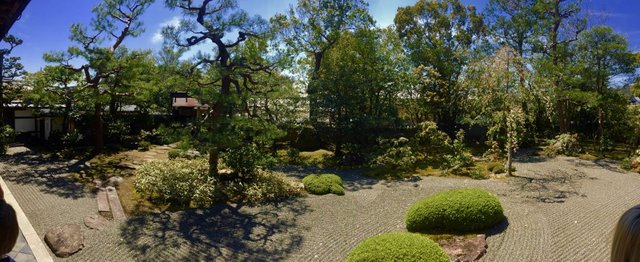
The garden at Shunkō-in Zen Buddhist Temple
I leave this temple to continue my exploration of more temples in this area of Kyoto. Heading north, I walk to Ryoan-ji. Known for its beautiful rock gardens, it originally began as the home of a local aristocrat during the Heian period, converted into a Zen Buddhist temple in the 15th Century.
Immediately I encounter crowds of noisy tourists jostling to take off their shoes and buy souvenirs. I find a spot to sit down at the rock garden, and ‘watch’ the garden. There are lots of interpretations about what this garden means, however no one is agreement. The monk earlier told me that Zen gardens are designed without a singular focal point.
Albeit I’m surrounded by people chattering away like monkeys I find this spot peaceful and beautiful. There is a deep magic here. I feel my heart sing and tears fall as I bathe in something full of wonder. Walking around the rest of the gardens, I can feel how alive this place is.
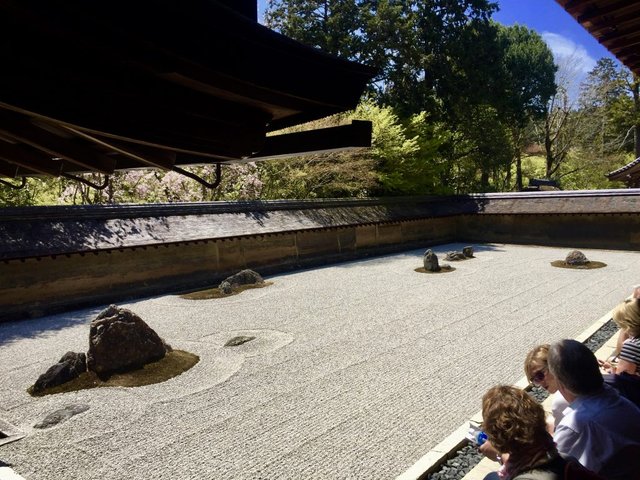
The rock garden at Ryoan-ji
I have kissed honey lips
Felt the healing in the fingertips
It burned like fire
This burning desire
— U2
Walking to Kinkaku-ji, I find I hate this place. There are possibly thousands of tourists everywhere, jostling and chattering; all to get selfies with the gaudy golden building. There is no peace or beauty here. I notice my strong reaction, and continue on to the next destination, the Daitoku-ji Temple Complex.
The first thing that struck me was the absence of tourists. There was no one here. Why was that? So close to previous one, and yet the car and bus parking area is empty, and there is maybe a half-dozen other people I can see.
Daitoku-ji — like Myōshin-ji — is a walled ‘estate’ full of smaller sub-temples. Only a handful of these are open to the public, and so I make my way to Ryōgen-in, known for its incredible rock gardens.
As I sit on the step, I notice I am the only one here. Not only that, but I cannot hear the sound of any traffic. It’s just me and this garden. As I watch the ripples emerge from the rocks, my heart opens again, and the same wave of emotion comes over me as it did Ryoan-ji. I allow it to arise, and to flow on, like the ripples before me. The peace and beauty I am moved by flows on, it is just like a stone being dropped into a pond: the impact and the consequences are just momentary.
Like Ryoan-ji, this place is alive in its silence. I don’t imagine tourists would want to come here. The song of this place keeps away those who won’t appreciate it. This place is stunning in its simplicity. There is no lavish golden temples, no instagrammable backdrops or souvenir shops.
The emblematic raked lines in all these gardens remind me of the Aboriginal songline paintings of Australia. The lines are like ripples: they emerge from protruding rocks following the curve of the contour, clashing with the straight lines which appear to emerge from the straight lines of the walls.
I can't help but wonder what the metaphor is. Do the perfectly straight lines represent actuality, while the rocks representing perceived reality disturb this order? Is this a model of the universe? If so, what does it mean to me? Do my perceptions of how things are protrude on an otherwise flawless experience of actuality (actual reality)?
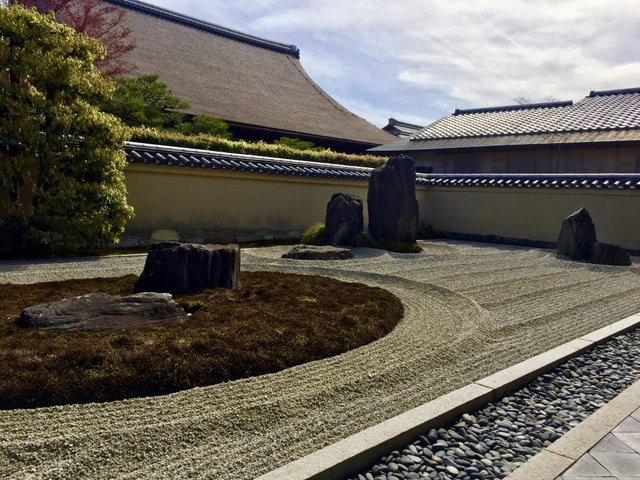
The rock garden at Ryōgen-in
We hear a sound and alter our returning
We drift the shadows and course our way on home
— Yes
Once again, I feel emotions arise, tears beginning to flow. I've always believed that there was a separation between the natural and the man-made; that in order to immerse myself in the sacred, I need to remove myself from cities and buildings and find myself in the wilderness.
And yet here I was in a man-made space, that emanated the same natural, sacred simplicity that I experience in the wilderness. My realisation is that somehow the Zen monks understood this, and that while they obviously created something man-made, it somehow stamped its presence on the natural world in such a way as to work with the contours of Heaven and Earth.
Is this the secret to Zen — to inquire deep enough to find one's true nature, so that what emerges ripples outwards in a gentle, non-assuming manner?
This requires being so still, so present, that one can almost blend in to the ecology. It's not about being in nature or not being in the city; this is an excuse I make. It is about where I am right now! This is why Taoism, Zen, and Shaivist-Tantra emphasise sacredness in the ordinary day-to-day.
Why try to live a life that isn’t real
Know how a mind that wants to wander
Around a corner
Is an un-wise mind.
— George Harrison
One thing I know about this idea of the truly authentic self that acts spontaneously from the Taoist tradition is that there is a potential that one's true nature could clash with the social norms — which very much characterises the conflicts between Taoists and Confucianists in early days. In later medieval times, the Quánzhēn Taoists, Neo-Confucianists, and Chánzōng (Zen) Buddhists combined ideas and doctrines and overcame this by understanding that an authentic-self wouldn't be truly authentic if its expression prevented the expression of other authentic-selves. This is because the universe seeks harmony and balance, and so one's nature is constantly adjusting itself to adapt, while remaining somehow unchanging.
I noticed in that moment how easy I had found it to flow through Japan, both geographically and culturally, even though I had no grasp of the language. The influence of Confucianism on Japanese culture shows itself in the ritualistic nature of many of its customs. I've heard many westerners comment on this, usually pointing out how hard it is to grasp. And yet, without knowing the forms of such customs (handing over money with two hands, for example), I understand the essence of them: courtesy.
My 'problem' (immediately I hear that Zen voice asking me why I think this is a problem) is that I am constantly ducking and weaving around the whims and wishes of other people. I am always accommodating the needs of others; and yet the solution is not to assert myself aggressively. The image of the bamboo groves of Inari Mountain I had walked through the previous day appear in my visual mind. These plants always symbolised the balance between firm strength and yielding flexibility, providing the metaphor for the element Wood in Taoism.
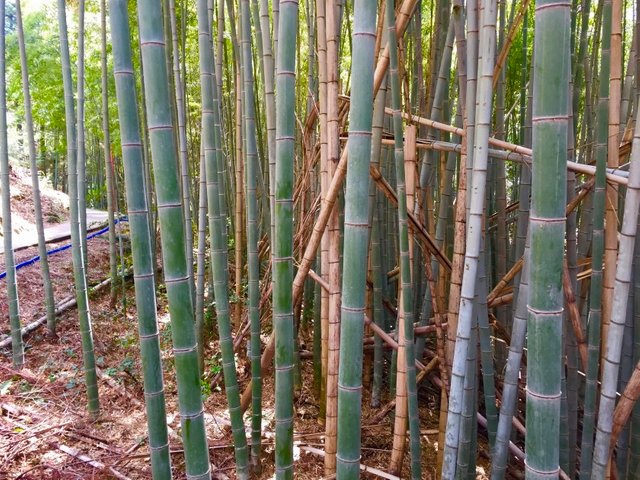
The bamboo groves on Inari Mountain
No wonder I have had such difficulties expressing my emotions in the past. I haven't had the strength to feel what I am feeling, let alone express them. There are many reasons for that, all of which become apparent as I sit in this place.
"My heart is like this garden with the rocks removed," I say to myself. "All straight, perfect lines. Ordered. Perfect. And yet, unnatural." And that Zen voice challenges me:
What is the purpose of that?
I'm afraid to let things be. I want to tightly control my emotions.
And what is wrong with that? What do you receive from such control?
Predicatbility.
And if you didn't have the predictability?
Unpredictable. Emotional.
And what happens when you are 'emotional'?
Nothing 'happens'; I am simply emotional.
And what is the problem with being "simply emotional"?
It hits me. What is wrong with being emotional?
The answer was of course: nothing.
I've become afraid to be 'emotional'. I've been ashamed of appearing irrational. Because that is somehow a sign of weakness, of inferiority. It renders me without some kind authoritativeness. If I cannot reason my way through life, I feel out of control. And yet, it is merely the illusion of control.
I've been so concerned with being in complete control and having total agency in my life that in many ways I've stopped living.
The realisation is one thing. Now comes the real challenge: relinquishing my attachment to this control. It means surrendering to my fears, my shame, my emotions. It means not having reasons for every little thing I think/say/do. It means not necessarily having any meaning to anything.
Simply being as it is.
And going where ever it is that the flow of life takes me.
I listen to the wind,
To the wind of my soul
Where I’ll end up, well I think
Only God really knows
— Cat Stevens
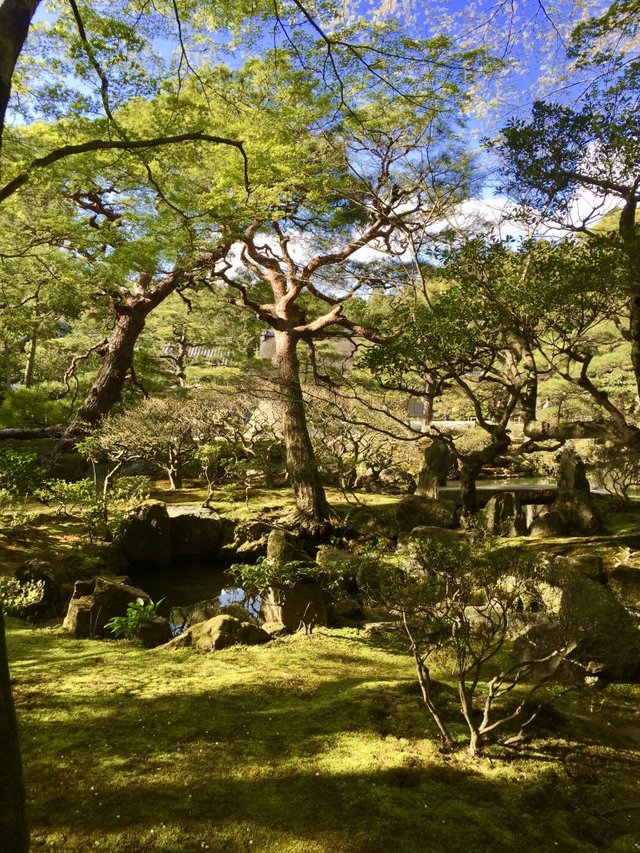
The Zen garden of Ginkaku-ji
Listen to the soundtrack to this story here
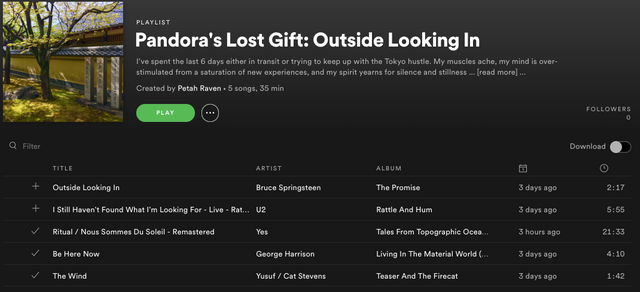
You can find more about the temples I mentioned in this article here:

 CREATE YOUR OWN @REVIEWME PROFILE TO START EARNING CREDIBILITY STARS FROM THE COMMUNITY!
CREATE YOUR OWN @REVIEWME PROFILE TO START EARNING CREDIBILITY STARS FROM THE COMMUNITY!CREATING YOUR PROFILE IS EASY! JUST FOLLOW THE STEPS HERE ☜(ˆ▿ˆc)








Posted from my blog PANDORA'S LOST GIFT with SteemPress : http://metametheus.net/outside-looking-in/
Congratulations, Your Post Has Been Added To The Steemit Worldmap!
Author link: http://steemitworldmap.com?author=metametheus
Post link: http://steemitworldmap.com?post=outsidelookingin-p6dvu1tzm4
Want to have your post on the map too?
To listen to the audio version of this article click on the play image.

Brought to you by @tts. If you find it useful please consider upvoting this reply.
This post was shared in the Curation Collective Discord community for curators, and upvoted and resteemed by the @c-squared community account after manual review.
@c-squared runs a community witness. Please consider using one of your witness votes on us here
Incredible post @metametheus. I got goosebumps. I am so glad you were able to have that experience. It's a great reminder to take care of yourself and just be in the moment.
What a beautiful reflection on what is. If only we could apply some Zen design to our modern cities. I loved your reflection on realising you don't need to escape to the wilderness to find what you are looking for.
Emotional... gah! I need less of that. I can Zen inquire about it, but too busy being emotional ;)
Find a comfortable seat... inquire through felt sense... yes. One of the things I love about the yoga studio I go to is they encourage that, without dictating what our flow SHOULD be. They stress their instruction is merely an option, that we are free to listen deeply to our own bodies and to choose the practice that suits us. Liberating and right.
Posted using Partiko Android
So happy for you and your self discoveries!
Thanks for sharing these experiences and helping me to appreciate the stillness and Zen gardens more!
Also that fear of loosing control and keeping such a tight reign on our emotions. I have struggled with this for a good part of my life too and I still do not have a very rich emotional expression!
What a GLORIOUS and rich post! I especially loved the image of the Zen gardens at Ginkaku-ji adn the way you wove the narrative between your own self inquiry and meditation practice, and the places you visited. Kyoto is on my radar for this coming year too!
Leading the curation trail for both @ecotrain & @eco-alex.
Together We’re Making This World A Better Place.
Click Here To Join the manually curated trail "@artemislives" to support quality eco-green content.
@ecoTrain